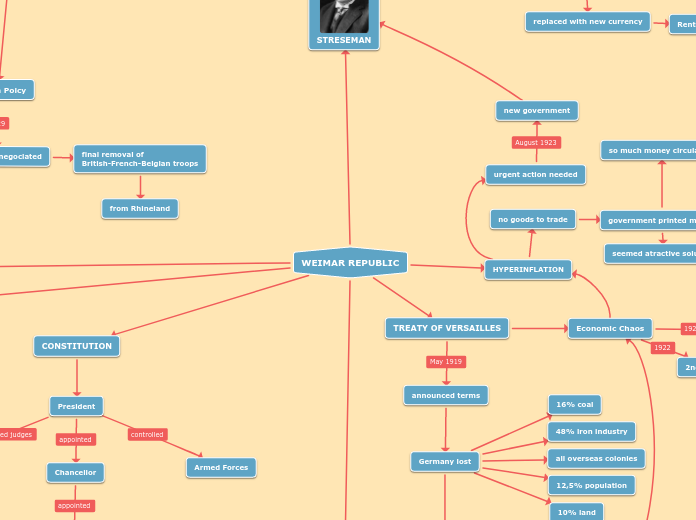door Sophia New 6 jaren geleden
868
Weimar Republic

door Sophia New 6 jaren geleden
868

Meer zoals dit
replaced with new currency
Rentenmark
Communists attacked Streseman
Nationalist attacked Streseman
joining League of Nations
signing Locarno Pact
Hindenburg elected as President
parties opposed to the Republic
Nazis and Communists
building up party organisations
many villages and country towns
represented moral decline
Wandervogel Movement
wanted return simple culture
only beneficiated
main losers
peasant farmers and middle class
thought government offered them little
workers of big industries
big landowners
big businesses
Young Plan negociated
final removal of British-French-Belgian troops
from Rhineland
accepted in League of Nations
signed Locarno Treaty
not changing Germany´s western borders
people reconciling way things were
republic began to settle
became more stable
songs critisising political leaders performed
censorship was removed
clubs: major pastime
Cinema´s Golden Age
greatest stars and directors ever
arquitects developed Bauhaus style
artists made powerful paintings
writers, poets flourished
achieved same production levels
as before WW1
industry recovering very well
exports increasing
reparations payements spread over long period
800 million marks
into Germany´s industry
so much money circulating
prices and wages rocketed
more affected
rich families
their huge savings
no valuables anymore
money worthless
prices rised in terms of SECONDS
paid off its debts
including war loans
seemed atractive solution
couldn´t be paid
Ebert try negociating
Allies ran out of patience
French-Belgian troops entered
Ruhr (industrial area)
taking goods and raw materials
government ordered workers
go on strike
French reacted harshly
expell 100,000 protesters from the region
killed 100 workers
correctly payed
in addition
forced to pay reparations
£6600 million
annual instalments
accept blame for starting World War 1
army reduced to 100,000
all overseas colonies
48% iron industry
16% coal
12,5% population
10% land
liked having strong army
wanted to have Empire
grew up in Kaiser´s days
Dr. Kapp
realised he couldn´t succeed
left country
hunted down
led 5000 Freikorps into Berlin
army refused to fire
Berlin workers declared
general strike
capital: no transport, power, water
Kap Putsch Rebelion
Freikorps
arragement with Ebert
stop rebelion
heavely armed
he couldn´t
anti-communist ex-soldiers
many fights with Spartacists
many casualties
Spartacists remainded anti-government force
wanted Germany be ruled by workers´councils or soviets
1919: joined by
some rebel soldiers and sailors
set up soviets in many towns
against Ebert´s democratics plans
Communist Party
like Lenin´s Bolsheviks
led by
Rosa Luxemburg
Karl Liebknecht
Government Ministers
condition: being more democratic
Kaiser refused
9th November, 1918
abdicated throne left the country
New leader of Republic
FRIEDERICH EBERT
inmediatelly
announced people
better working conditions
freedom of speech and worship
signed armistice with Allies
socialist
was dangerous-violent-unstable